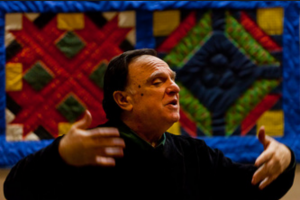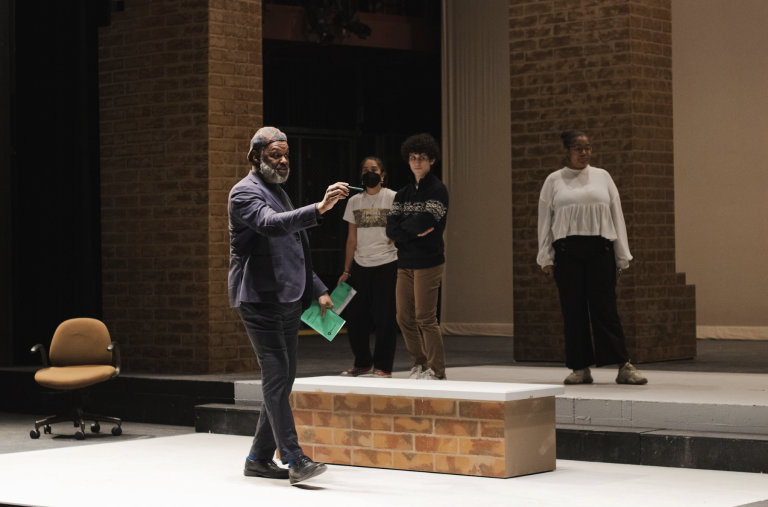BEN GAMBUZZA ’20

MANAGING EDITOR
After 40 years of teaching at Trinity College, Prof. Gerald Moshell will retire in June, 2018. On Friday Sept. 22, he conducted a special concert to commemorate his time here. The program featured many of his favorite works, some influenced heavily by the composer he respects most: Igor Stravinsky. The orchestra was made up of members from the Hartford Symphony as well as other local professional musicians. Prof. Moshell also invited several of his former Trinity students to participate including: Patrick Greene ’07 as tenor, Meg Kiley Smith ’09 as mezzo-soprano, and Christopher Houlihan ’09 as harpsichord soloist. The audience comprised of professor’s colleagues and and his friends who graduated with Moshell from Pomona College in 1967. At the end of the concert, Moshell expressed his utmost gratitude.
The concert itself was an exhilarating journey across musical styles. First, Christopher Houlihan ’09 performed as soloist in de Falla’s (1876-1946) Harpsichord Concerto, a work of rhythmic and harmonic complexity which was executed by Houlihan with brilliant clarity and impetus. Astonishing in its dissonance, unpredictable in its melodic texture, the work is exemplary of Stravinsky’s neoclassical style, something of a rarity in de Falla’s native Spain.
Next came Schoenberg’s Chamber Symphony in E major. The sometimes mind-numbing work exemplifies the Second Viennese School composer’s break from tonality and movement toward 12-tone interaction between individual instruments. The work was hard to follow, with no clearly defined recurring melody or discernable motifs. It was vexing and momentous, perfectly suited for such a vexing and momentous professor.
The second half of the program consisted of vocal music including Bach’s Cantata No. 65 and musical theater excerpts by Stephen Sondheim, Gilbert and Sullivan, Leonard Bernstein, and Marvin Hamlisch. There were two particularly notable and moving parts of the second half. One was Moshell’s own setting of Shakespeare Sonnet 116, “Let me Not to the Marriage of True Minds”, from his very own musical, Lives and Loves (2015). Before conducting the short excerpt with the original cast, he recited the sonnet from memory. The house was silent as this titan of music touched everyone with words that seemed to come straight from the heart. It was a side of Prof. Moshell some students were perhaps not used to seeing.
The last and most poignant work of the program was the Quartet Finale of Act 1 of Bernstein’s opera Candide, based on Voltaire’s philosophical satire novel of 1759. This was the definitive send-off for Moshell, as the opera’s lyrics suggest. Candide (the protagonist) sings, “Once again we must be gone/ moving onward to the New World!” Though in the novel Candide travels across the Atlantic to South America, Moshell sees these lyrics as his journey from academia into retirement. “Farewell to distress! All hail to our happiness!” After 40 years of dedication to Trinity, Moshell deserves nothing less.
Moshell has had a fruitful and illustrious career. After graduating Pomona in 1967, he went on to earn his M.A. (1970) and Ph.D. (1979) in Music from Harvard. His dissertation was entitled “Death, Non-Death, and Rebirth in the Neo-Classical Tragedies of Igor Stravinsky”. This fascination with Stravinsky carried on into Moshell’s academic career, and spurred his interest in musical theatre. Between 1969 and 1979, not only was he the Assistant Conductor of the Harvard Glee Club, the Harvard University Choir, and the Harvard Summer Baroque Ensemble, but was also a Teaching Assistant (1973) and a personal assistant (1972-1973) to none other than Leonard Bernstein. Bernstein even offered Moshell a position as his general music assistant, but he turned it down to work in academia. Thousands of dedicated students are today thankful for his decision.
Moshell came to Trinity in 1977 as an instructor and soon after started and directed Trinity’s musical theater program. Throughout the years, he has conducted the Trinity Orchestra (1979-1987) and taught numerous courses from “Shakespeare in Music” to “Grammar: A Matter of Timing” to “The Birth of Modernism”. He was a member on the Connecticut State Commission on the Arts from 1999-2003. He also translated into English the French Stravinsky-Gide opera-ballet Persephone, performed as a pianist and accompanist, and arranged songs of Gershwin performed (1998) by the Frankfurt (Germany) Radio Symphony conducted by Hugh Wolff.
Moshell has had great success as student, pianist, composer, and most of all, teacher. Students will remember him as demanding, creative, and smartly stubborn. He has left a legacy at Trinity that will live on in his former students, many of whom attended his Friday performance. As Moshell signified in Candide, this is not the end, but the beginning of a new life.
Tuesday, January 14 2025
The Student Newspaper at Trinity College in Hartford, Connecticut





+ There are no comments
Add yours